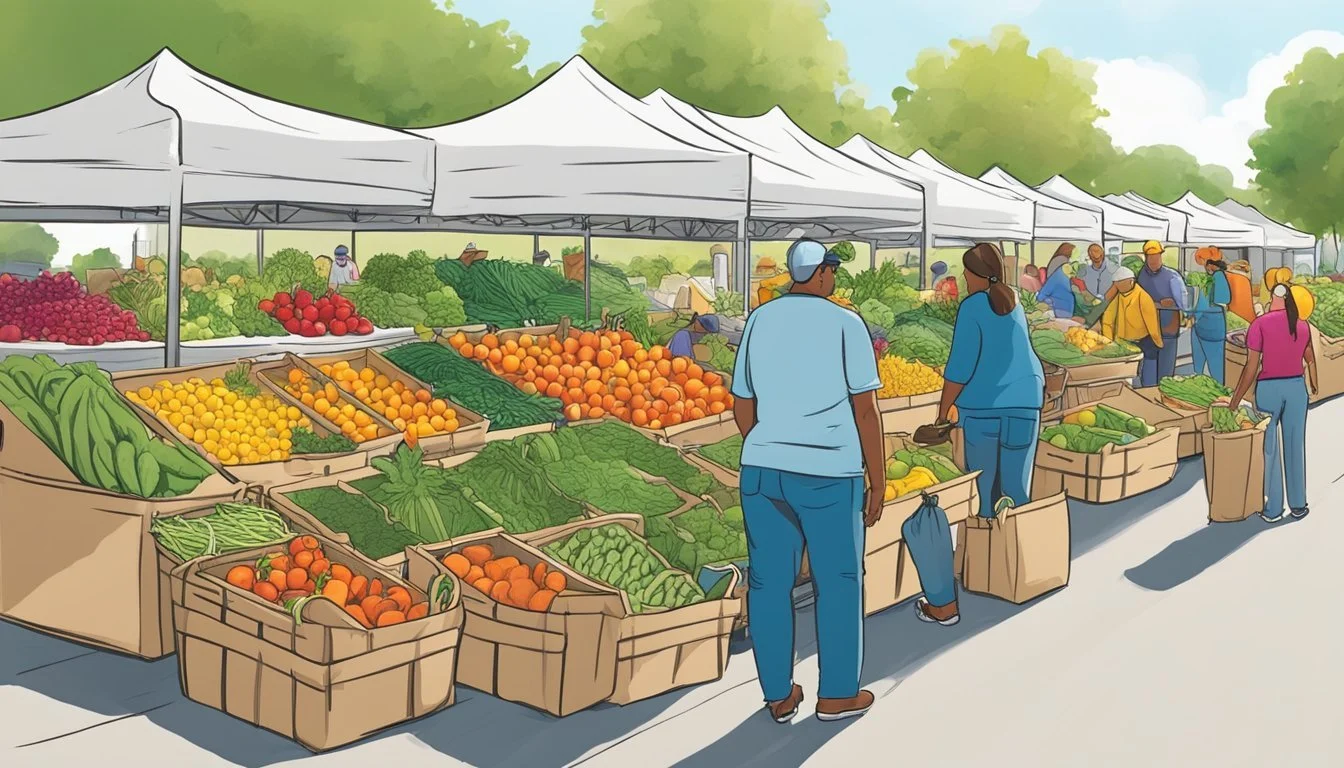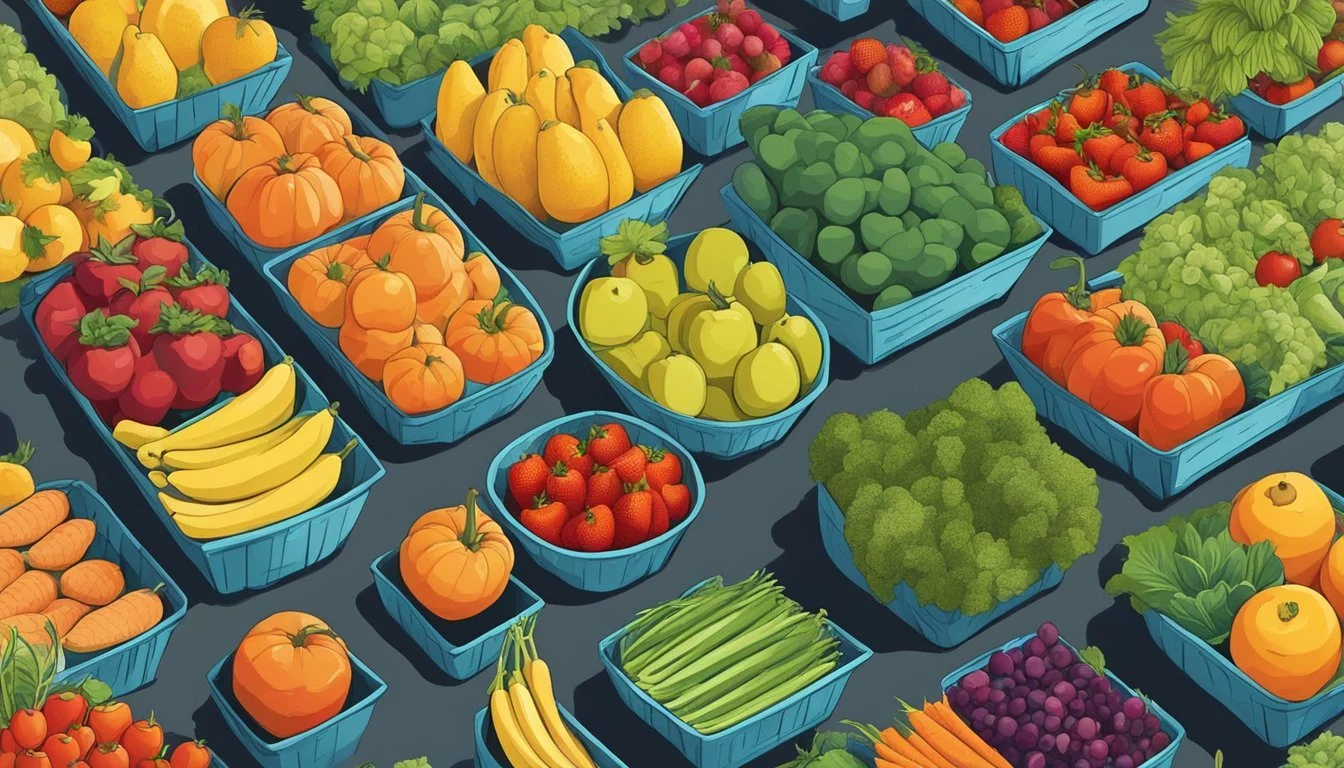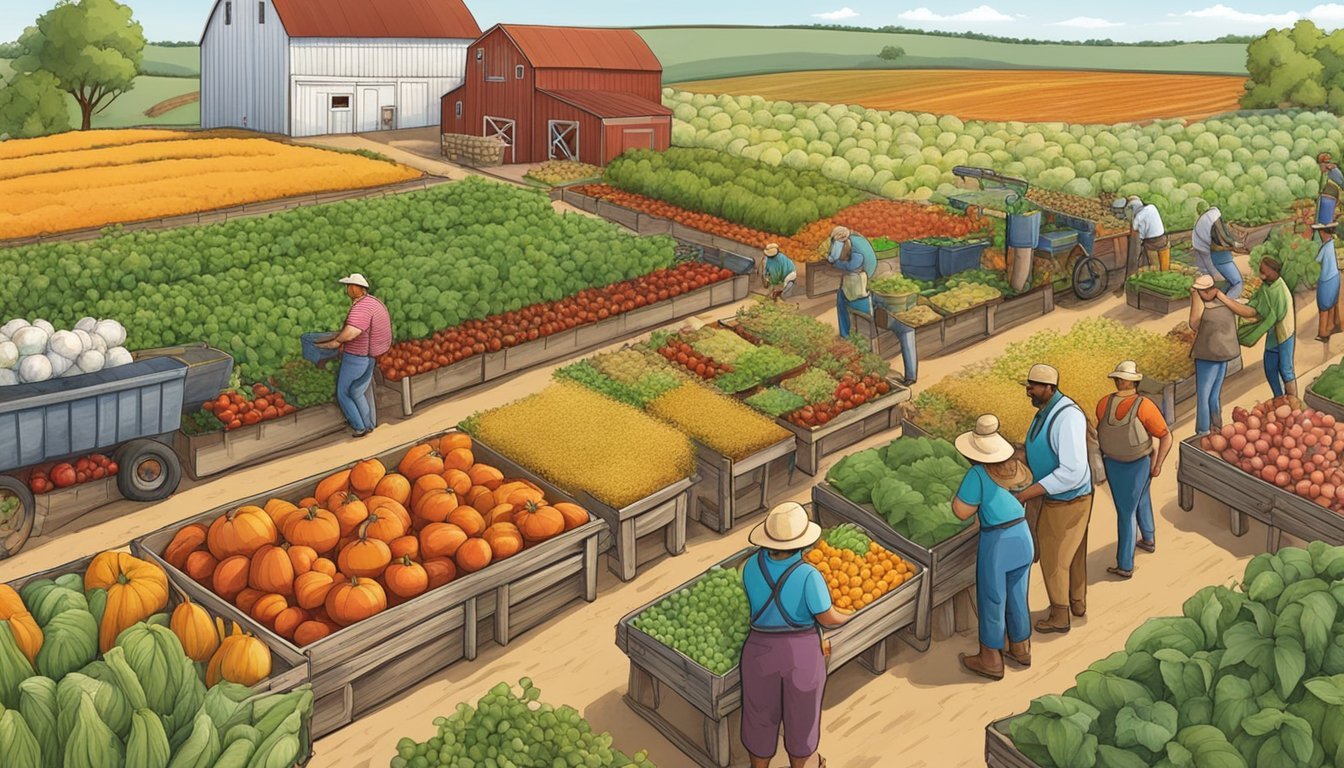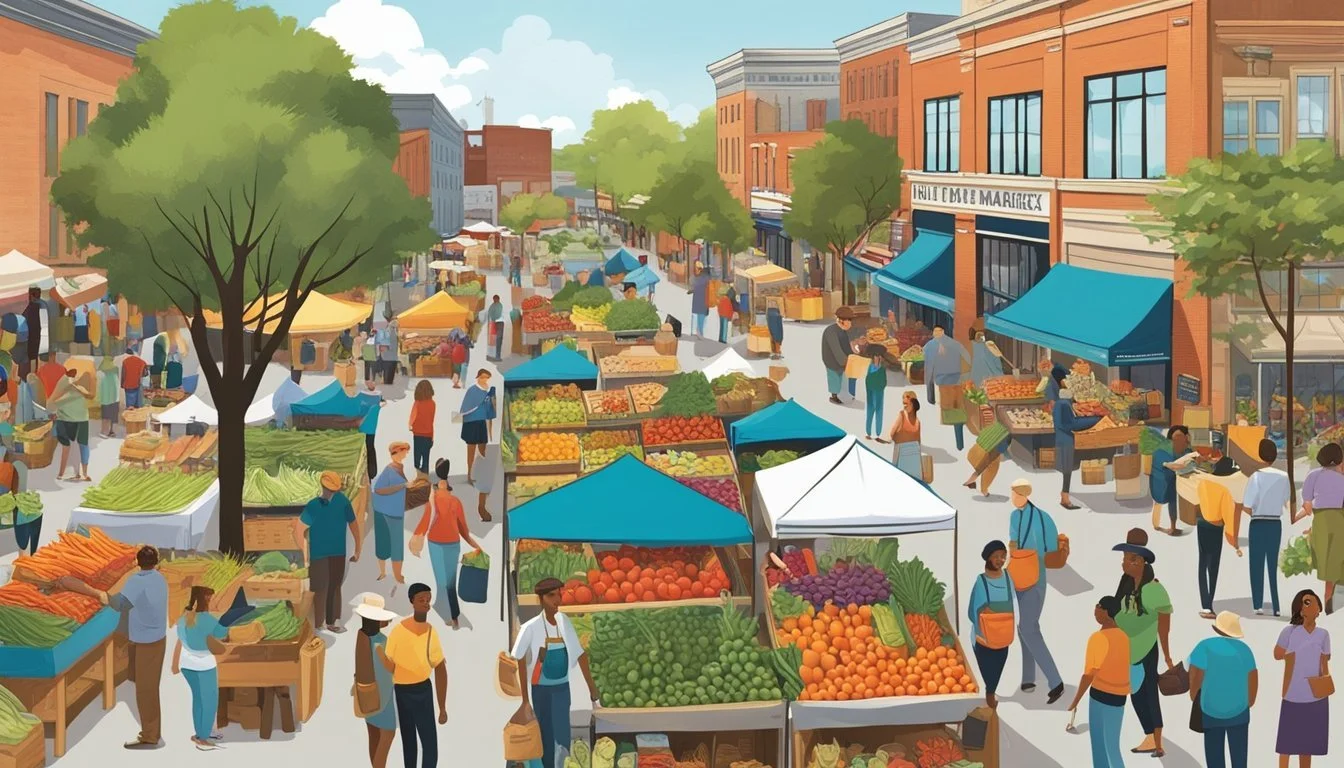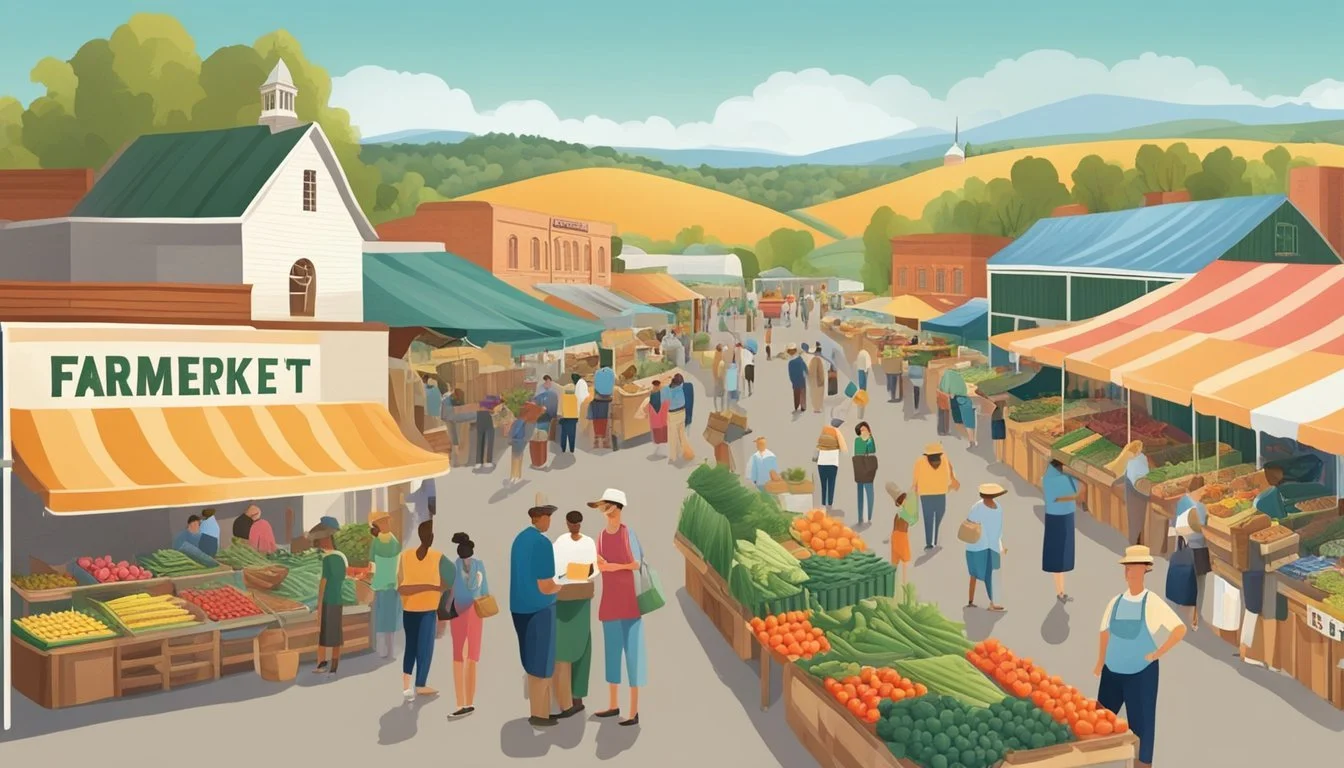Community Supported Agriculture (CSA) in Kansas City, KS
A Guide to Local Produce Partnerships
Community Supported Agriculture, or CSA, is a mutually beneficial partnership between local farmers and community members in Kansas City, Kansas. In this system, residents support their local agricultural community by purchasing seasonal subscriptions, which provide them with a regular share of the farm's produce. This model fosters a direct link between the producers and consumers, ensuring that community members receive fresh, locally-grown fruits and vegetables, while farmers gain financial stability and a guaranteed market for their harvest.
CSAs in Kansas City operate with an emphasis on sustainability and community engagement. Members typically receive their shares weekly during the growing season, which not only sustains their household with nutritious produce but also educates them on seasonal eating. The program often extends beyond mere transactions; many Kansas City CSA farms invite members to experience agriculture first-hand through farm visits, pick-your-own opportunities, and participation in the farming process, thus reinforcing the community aspect of CSA.
Overview of CSA in Kansas City, KS
In Kansas City, Kansas, Community Supported Agriculture represents a thriving model of local, sustainable food systems. Farmers and community members work collaboratively, ensuring that high-quality produce is accessible throughout the area.
Historical Development
Community Supported Agriculture (CSA) has evolved significantly in Kansas City, KS. Initially, local farmers sought ways to connect directly with consumers, providing them with seasonal produce while gaining financial support for their farming operations. This led to the establishment of multiple CSA networks within the Kansas City area. In particular, the CSA presence grew under the influence of organizations like the Kansas City Food Circle, promoting local food from farms operating within a 125-mile radius of the city.
Significance of Local Produce
The emphasis on local produce within Kansas City's CSA networks highlights their commitment to sustainable farming practices. By providing local food to the community, these CSAs reduce food miles and foster an environmentally responsible ethos. Consumers benefit from the freshness and nutritional value of food that hasn't traveled long distances, and farmers enjoy the stability of a community-supported financial model. Working in tandem, the community and farmers strengthen their local economy while upholding sustainable agricultural methods.
Joining a CSA Program
Community Supported Agriculture programs in Kansas City connect consumers with local farms, offering fresh, seasonal produce. CSA memberships often involve upfront fees and a commitment to support a local farm through regular produce pickups.
How to Sign Up
Individuals looking to join a CSA program typically start by completing an application form. The form can often be found on a farm's website or requested via email. Prospective members should contact the CSA of their choice directly to inquire about availability and sign-up periods. Most CSAs in the Kansas City area require members to sign up in advance of the growing season.
Understanding Membership Fees
A membership fee is required to join a CSA program, which covers a share of the harvest throughout the season. These fees are usually paid upfront but sometimes can be made in installments. Some farms offer a sliding scale for payments to accommodate various income levels. Members should confirm the fee structure before signing up to ensure it fits their budget.
Fee Structure Description Single Payment Full amount is paid upfront, often before the season starts. Installments Payments are split over a period, such as monthly. Sliding Scale Fees are adjusted based on the member's ability to pay.
Expectations for Members
Upon joining a CSA, members are expected to adhere to the pickup schedule and be mindful of the farm's operational guidelines. A commitment to the entire season is typical, meaning that members share in the abundance as well as the risks, such as weather impacts on crops. Members should ensure they can fulfill these commitments to support their local farm effectively.
Common CSA Models in Kansas City
Kansas City hosts several CSA models that cater to a variety of preferences and needs within the community. These models offer fresh, locally-grown produce directly to consumers, with each entity holding its unique strengths.
New Roots for Refugees
New Roots for Refugees builds on the agricultural experience that refugees bring from their home countries, providing them with the opportunity to establish their own small farms. This program empowers them to grow produce and contribute to the local food system in Kansas City through the operation of their own CSAs.
Rolling Prairie Farmers Alliance
Rolling Prairie Farmers Alliance stands as a cooperative network of local farms. This coalition allows for a diverse offering of produce, with subscriptions typically running during the Kansas growing season. Shareholders receive a variety of seasonal fruits and vegetables, supporting sustainable agricultural practices and promoting food security.
Fair Share Farm
Fair Share Farm emphasizes quality and community engagement. It operates on a membership basis, where subscribers receive weekly shares of fresh produce, including options for home deliveries. Fair Share Farm prioritizes organic farming methods, demonstrating a commitment to environmental stewardship and healthy food distribution.
Collectively, these CSAs represent the rich tapestry of Kansas City's agricultural community, each providing a unique way for consumers to engage with and support local farmers.
Benefits of CSA Participation
Participation in a Community Supported Agriculture (CSA) program offers tangible advantages for both consumers and producers. They enjoy fresh, local produce while directly supporting family farms and contributing to sustainable agricultural practices that benefit the environment.
Freshness of Produce
Members of a CSA receive food that is often harvested within a day of pick-up, ensuring an unmatched level of freshness. This direct farm-to-table approach results in produce that retains more nutrients and offers superior flavor compared to items that travel long distances.
Supporting Family Farms
CSA programs are vital in sustaining family farms. By providing financial support through subscription fees, members help farmers achieve a stable income. This relationship allows farms to plan more effectively for the harvest season and reduces the financial uncertainties associated with farming.
Environmental Impact
CSA practices commonly align with sustainable and ecosystem-friendly farming. These methods include responsible use of soil and water resources, reducing the carbon footprint through minimized food miles, and often avoiding harmful pesticides. Members contribute to a healthier environment by supporting farms that prioritize these values.
What You Can Expect from CSA Shares
Community Supported Agriculture shares are an investment in local agriculture that provides members with a portion of the farm's produce. This system not only supports Kansas City's farmers but also brings fresh, seasonal food directly to the community.
Typical Inclusions in Shares
Vegetables: A staple of CSA shares, members can expect a variety of fresh vegetables each week.
Fruit: Depending on the season, fruit varieties are included alongside vegetables.
Herbs: Aromatic herbs often complement the produce selection.
Flowers: Some shares might offer the option of fresh flowers.
Eggs, Meat, and Dairy: Although not as common, some farms include eggs, a selection of meats, and dairy products.
Honey: Occasionally, local honey may be a sweet addition to CSA shares.
Seasonal Offerings
Spring: Expect leafy greens such as spinach and lettuce, and early vegetables like radishes and peas.
Summer: Shares typically brim with tomatoes, peppers, cucumbers, and summer squash, alongside a selection of stone fruits.
Fall: Hearty offerings may include pumpkins, root vegetables, and apples.
Winter: While less common, some winter shares provide preserved goods or storage crops such as squashes and potatoes.
Delivery and Pickup Options
Weekly Delivery: Farms usually deliver CSA shares to members on a weekly basis, ensuring freshness.
Pickup: Members may also have the option to pick up their shares from designated local spots.
Selective Dates: During the winter, pickups/deliveries may be scheduled less frequently compared to the regular season.
CSA Management and Farming Practices
Community Supported Agriculture (CSA) in Kansas City, Kansas, thrives on a commitment to sustainable farming and adhering to the region's natural growing cycles. These principles guide local farmers in producing a diverse array of vegetables and fostering the health of the soil.
Sustainable Agricultural Methods
In Kansas City, farmers implement sustainable practices to ensure the longevity and fertility of their land. They focus on feeding the soil with organic matter and maintaining biodiversity to support a healthy ecosystem. By minimizing synthetic inputs, farms can produce seasonal vegetables while preserving environmental integrity.
Crop Rotation: Farmers rotate crops to optimize nutrients in the soil and prevent pest accumulation.
Composting: Organic waste is turned into compost to enrich the soil without chemical fertilizers.
Cover Cropping: Non-cash crops are planted in off-seasons to prevent soil erosion and improve soil health.
Seasonality and Farming Cycles
CSAs in Kansas City are synchronized with natural farming cycles, allowing consumers to receive fresh, seasonal vegetables throughout the growing season. Farmers plant and harvest according to the cycles of the sun and temperature, optimizing crop health and yield.
Spring Planting: Cool-season crops are planted after the last frost, leveraging the increasing sunlight.
Summer Harvesting: As the sun is at its peak, a variety of vegetables are harvested at their optimal taste and nutritional value.
Fall Preparation: Farmers prepare the soil for winter, often including planting of cover crops to protect and nourish the land.
Additional Offerings and Partnerships
Kansas City's CSA programs extend beyond produce to include a variety of locally sourced goods and community-focused initiatives.
Beyond Standard CSA Shares
In addition to vegetables and fruits, many Kansas City CSA programs offer additional items to their shares. Subscribers can often add products such as bread, milk, and a variety of meats including pork, chicken, turkey, and beef. These items are typically sourced from local producers within the region, ensuring freshness and support for nearby farmers.
Bread: Often baked by local artisans using traditional methods.
Dairy: Includes fresh milk, sometimes from grass-fed cows.
Meats: A range of poultry and red meats, adhering to responsible farming practices.
Community Engagement and Outreach
CSAs in Kansas City are more than food distribution networks; they are central to fostering community ties and enhancing neighbor relations. Many participate in partnerships with local schools and other organizations to provide education about sustainable agriculture and healthy eating habits.
Partnership Programs: Collaborative efforts with other local entities to broaden the impact.
Education: Workshops and events focused on food literacy and agriculture for all ages.
Community: Initiatives to connect members and strengthen regional food systems.
By integrating these options and programs, CSAs reinforce their commitment to the health of both their members and the local food economy.
Challenges and Considerations
When engaging with Community Supported Agriculture (CSA) in Kansas City, participants encounter various challenges that can impact their experience. Weather inconsistencies and economic factors play a significant role, while the commitment required from members is crucial for the sustainability of a CSA program.
Weather and Crop Variability
Kansas City's climate can lead to unpredictable weather conditions, impacting Gasper Family Farm and Fair Share Farm among others. Crop variability due to weather extremes can result in changes to the expected yield. This may cause missed pickups or a change in the variety of produce available.
Missed Pick-ups Due to Weather:
April-October: CSA pickups usually happen weekly; weather disruptions can affect this schedule.
Winter Months: Selected Saturdays may offer pickups; severe weather can lead to cancellations.
Membership Commitment
Members of a CSA, often bound by a membership fee, commit to supporting the farm throughout the season. This agreement helps farms like Fair Share Farm to plan ahead based on secured funding through membership fees. However, members need to be aware that their commitment can sometimes result in excess produce or, conversely, less than anticipated harvests, which they must accommodate as part of the CSA model.
Membership Fee Options:
Standard Fee: A traditional upfront payment for the season.
Sliding Scale: A payment structure meant to accommodate different income levels.
Economic Factors
Economic considerations, such as setting a fair membership fee and ensuring the farm's financial viability, are critical. Farms must find the balance between the cost of operations and the price of CSA shares to ensure they can sustainably provide for the community. Members benefit from understanding that their fees contribute to the stability of local agriculture and supporting a local business like Gasper Family Farm.
Financial Sustainability:
Fair Share Farm: Utilizes membership fees to cover production costs and invest in farm operations.
Gasper Family Farm: Aims to provide a fair share to both the farmer and the consumer through their pricing model.
Supporting Local CSA Initiatives
Community Supported Agriculture (CSA) initiatives in Kansas City play a pivotal role in bolstering local agriculture, providing residents with fresh local produce, and enhancing community engagement in sustainable practices.
How Consumers Can Get Involved
Consumers can actively participate in CSA initiatives by subscribing to seasonal shares from local farms. They can start by consulting the master list of CSAs in the region to add themselves to a farm's waiting list or to secure a subscription. This allows them to receive a regular allotment of fresh, seasonally appropriate products, often with the opportunity to help out on the farm and learn about feeding the soil and organic farming techniques.
Subscribing to a CSA: A commitment to a full or half share of a farm's produce.
Volunteering: An offer of one's time to assist with farm operations and community outreach.
Education: Attending workshops or farm days to learn more about agriculture and nutrition.
Role of Local Businesses and Restaurants
Local businesses and restaurants have a unique opportunity to support CSAs by featuring locally sourced ingredients in their offerings. By doing so, they not only foster the local economy but also promote nutrition and the farm-to-table movement.
Procurement: Establishing partnerships to source ingredients from CSAs.
Promotion: Highlighting local CSA products on menus and in stores.
Support: Financial or in-kind contributions to assist with CSA operations or educational programs.
Educational Potential
CSAs inherently possess educational potential, serving as real-world classrooms for both adults and children. They offer hands-on training in sustainable farming practices, nutrition education, and the value of eating seasonally.
Workshops and Farm Visits: Programs to teach participants about sustainable agriculture and healthy eating.
School Partnerships: Collaborations that integrate the CSA experience into student curricula.
Community Events: Opportunities for the broader community to engage with local farmers and learn about the origins of their food.
By investing in CSA initiatives, Kansas City residents and businesses can profoundly impact local agriculture, education, and community health.


